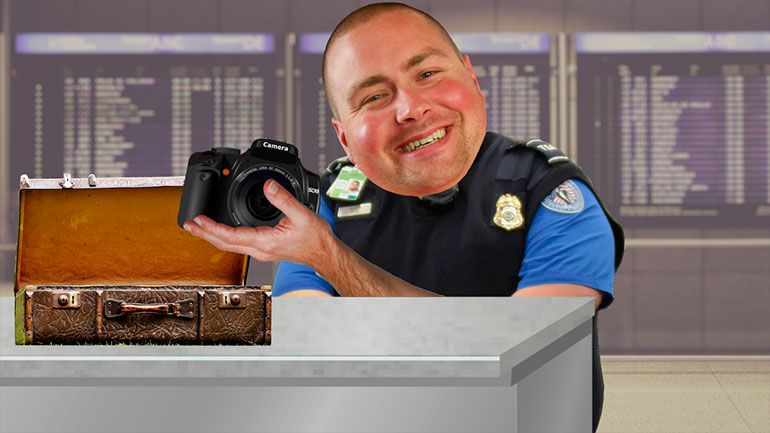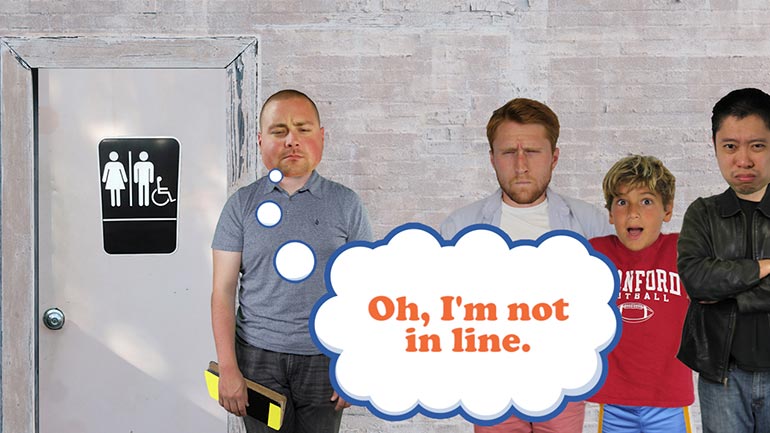ShmoopTube
Where Monty Python meets your 10th grade teacher.
Search Thousands of Shmoop Videos
Web Literacy: Credibility of Web Sources 3171 Views
Share It!
Transcript
- 00:01
We speak student!
- 00:06
Credibility of Online Sources
- 00:10
[ bird caws ]
- 00:11
What is a credible source?
- 00:13
So, first let's look at that word.
Full Transcript
- 00:15
"Credible" basically just means "believable."
- 00:17
It means "trustable."
- 00:19
- Like street cred? - Exactly.
- 00:20
There's probably some Latin derivative of that.
- 00:21
- There is, actually. - Wow.
- 00:23
- I think. I know there is an Italian derivative. - Well, "credo" would be...
- 00:26
Right, exactly.
- 00:28
So, in Italian, and I'm assuming Latin,
- 00:30
the verb means "to believe."
- 00:32
Credibility means that you can trust or believe that source.
- 00:35
That's basically it.
- 00:37
If you go to Joe Shmoe's blog
- 00:39
and you read about something
- 00:41
versus going to a .gov site
- 00:44
and reading about something.
- 00:45
.Gov is more credible.
- 00:47
That's kind of what it comes down to.
- 00:49
But there are a few ways that you can determine credibility.
- 00:52
And we talked a little bit about this with
- 00:54
what sources are cited.
- 00:56
But there's four main categories.
- 00:58
Let's see if I can get them.
- 00:59
Authority,
- 01:01
currency,
- 01:03
objectivity, and support.
- 01:05
So let's start with authority.
- 01:07
This is the big one.
- 01:08
Basically, who wrote it?
- 01:10
Why did they write it?
- 01:11
and should we believe them?
- 01:13
are the questions we want to ask.
- 01:15
Who's the author?
- 01:16
Is the author someone who has
- 01:19
the right background information to be giving us this information?
- 01:22
Where are the author's credentials?
- 01:24
Does it just say,
- 01:25
"Dave Siminoff"?
- 01:26
Or does it say "Dave Siminoff, founder of Shmoop"?
- 01:29
How do we know?
- 01:29
And if you don't know, go ahead and look the person up.
- 01:31
See who they are.
- 01:33
You wanna know where is this article being published?
- 01:38
Or where is -- Whether it's an article or whatever it is online,
- 01:40
where it's being published.
- 01:41
Is it in a news source that you know to be credible?
- 01:44
Is it in a tabloid which is not as credible?
- 01:47
Is it on a blog? Is it on Wikipedia? Et cetera.
- 01:51
So where the author is publishing it is important.
- 01:54
And you can go down the list.
- 01:55
But the main question here is
- 01:57
"Is the person writing it and the people publishing it
- 02:00
together are they people you can trust in?"
- 02:04
And you might need to do some checking to find that out.
- 02:08
Fair enough. And it's called LinkedIn.
- 02:10
It's really good for checking these things.
- 02:11
So the second thing is currency or, "Is the information current?"
- 02:16
Number one thing, always look for a date.
- 02:18
Depending on what you're reading about,
- 02:20
it might not be as important.
- 02:21
When you're talking about celebrities and fame,
- 02:23
you definitely want current stuff.
- 02:24
So you might be reading an article and be like,
- 02:26
"Oh, man! There was a study that showed that
- 02:28
zebras can talk?
- 02:30
That's crazy!"
- 02:31
And then it turns out that was in 2009
- 02:34
and they did another study in 2014
- 02:36
- and realized zebras can't talk. - Or it would've been 2009 BC
- 02:39
- and Noah was having the conversation. - [ laughs ] Exactly, exactly.
- 02:42
So, yeah, you have to make sure that the information is current.
- 02:45
That's really important when it comes to stuff like science
- 02:47
which changes all the time.
- 02:48
The third thing is objectivity.
- 02:50
This is what we talked about before.
- 02:51
Is it an objective source?
- 02:52
How do we find objectivity?
- 02:54
Because we're in a world today
- 02:55
where there are very few truly neutral sources.
- 02:58
The evening news and, I guess with early cable news,
- 03:01
was unapologetically brutally honest.
- 03:04
And it showed pictures that were graphic
- 03:06
that you wouldn't see in a normal prime time setting.
- 03:09
And it was a journalist's credo
- 03:11
to be credible, to be honest.
- 03:14
Even if it went against their own beliefs
- 03:15
and their own political bias,
- 03:17
they strove to tell the truth.
- 03:22
Today's world could not be more different.
- 03:25
Everyone -- It's like they're marketing for a political side
- 03:28
in one venue or another.
- 03:30
It's like trying to view
- 03:31
the world's history through a big, thick thing of gauze.
- 03:34
Because nothing is clear anymore.
- 03:36
There's very few honest lights.
- 03:38
As you said, that's kind of how the world is.
- 03:41
It's very hard to find an objective source.
- 03:43
Even scientific, academic papers
- 03:46
have some sort of bias from the author.
- 03:48
There always is.
- 03:49
The baggage an author or a publisher brings with them to a text
- 03:54
is always gonna skew the language
- 03:57
and how it's written one way or another.
- 03:58
So all we can do is be aware of that
- 04:00
and be ready for it.
- 04:01
It's totally fine to cite something
- 04:03
from a right-leaning or left-leaning source,
- 04:05
as long as you acknowledge
- 04:07
that it is right-leaning or left-leaning
- 04:09
and therefore might be biased.
- 04:11
We can't control how biased a specific journalist is
- 04:16
or author of a text is.
- 04:17
All we can do is be prepared for it
- 04:20
and understand that and really look for it.
- 04:22
So you're looking for maybe the most objective possible.
- 04:25
If you have a choice between
- 04:26
a newspaper article that's written in Fox news
- 04:31
or one that's written in MSNBC
- 04:33
and one that's written in something that people might say
- 04:35
is a little more neutral,
- 04:36
then you would wanna go with the more neutral one
- 04:38
if you had the choice.
- 04:39
If you didn't, and those were your two options,
- 04:41
great, use them. But say,
- 04:42
"Hey, I acknowledge this.
- 04:44
While MSNBC is left-leaning,
- 04:47
so we have to take what they say with a grain of salt,
- 04:50
they say that blah blah blah..."
- 04:52
And then the same with Fox news.
- 04:53
So we just have to be aware of it.
- 04:55
Got it. Makes sense.
- 04:56
And then the last category is support.
- 04:58
And this is when we're talking about citing sources.
- 05:00
Who is the author or the publisher citing?
- 05:04
When you come to Shmoop,
- 05:05
we don't cite Wikipedia as a source.
- 05:08
So, I love Wikipedia, I'm just gonna say that.
- 05:10
If I need to know, like you said,
- 05:12
just some basic information about something,
- 05:13
absolutely start there.
- 05:15
But that's what I always say, "Start there."
- 05:17
If you have no idea
- 05:19
what a topic is about --
- 05:21
If you were to say to me right now,
- 05:23
"I need you to know what this tiny particle of an atom
- 05:28
of a nucleus something is."
- 05:30
I have no idea what you're talking about, clearly.
- 05:32
[ laughs ] As you can tell by what I just said.
- 05:34
So finding a scientific article about it isn't gonna help me.
- 05:39
What I'm gonna do is I'm gonna go to Wikipedia
- 05:40
and I'm gonna be like, "Oh, this is what he's talking about."
- 05:42
Then I'm gonna go to the scientific article.
- 05:43
So just get that out there,
- 05:45
Wikipedia is a fine place to get an overview
- 05:48
of a subject.
- 05:49
You just can't necessarily trust everything you read
- 05:51
because it's written by people like you who know nothing.
- 05:54
Wikipedia does have experts writing,
- 05:57
but it also has people with huge biases writing.
- 06:01
And while it's moderated,
- 06:03
not everything is caught.
- 06:04
And you go to pages and it'll say like,
- 06:06
"This article is a stub." or "This article doesn't cite its sources."
- 06:09
And you see that a lot on Wikipedia.
- 06:11
So you just have to be really careful.
- 06:12
The one thing you can do if you are using Wikipedia is
- 06:15
anything that's not cited, don't trust it.
- 06:18
And if it's cited, there's that little blue number next to it.
- 06:21
Click it. It drops you down to the bottom of the page.
- 06:23
And it shows you what that source was.
- 06:26
Go to the original source.
- 06:27
If so-and-so said --
- 06:29
This is the page on zebras and it says,
- 06:31
"Zebras can talk."
- 06:33
and there's a little source,
- 06:34
click down to the link,
- 06:35
and if you click on that and it is a link to Nature
- 06:38
or Science or some periodical that's valued,
- 06:41
then you go, "Hey! Zebras can talk! Okay."
- 06:43
If you read that and it actually says that.
- 06:45
Yeah, and more likely than not, it's a link
- 06:47
- to NFL Referees. - Exactly.
- 06:49
[ laughs ] Exactly.
- 06:51
So you always have to check the source.
- 06:54
And that trickles down everything you're reading.
- 06:57
Whenever you're reading something, check the source,
- 06:58
check that person's source, check that person's source.
- 07:01
[ pen writing ]
- 07:03
What is a primary source?
- 07:06
What is a secondary source?
- 07:08
How can sources vary in credibility?
- 07:14
And that's "vary" with an "A."
Up Next
Related Videos
What's the difference between a real estate agent and a real estate broker? Is the latter just, uh... out of cash? Quite the opposite, in fact. Jum...
So... what's a TSA worker, and what do they do? Oh, we thought maybe you knew. Okay, okay... so TSA (or Transportation Security Administration) wor...




